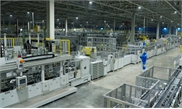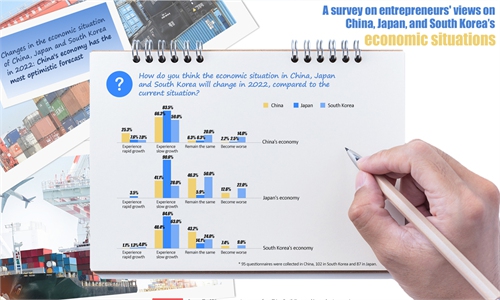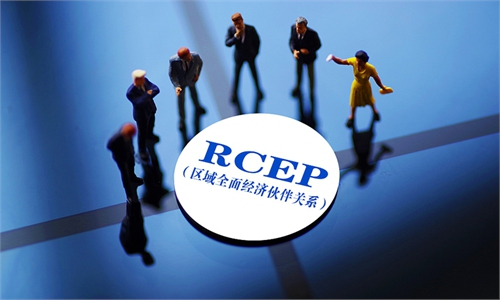South Korean cosmetic brands lose shine in China
Brands fail to adapt to changes in Chinese market

A HERA booth at the 3rd China International Import Expo in Shanghai on November 7, 2020 Photos: VCG
HERA, a high-end South Korean cosmetic brand under AmorePacific, recently announced that the brand is shuttering its bricks and mortar stores across China, while its official Wechat store suspended online sales on Tuesday.
HERA is not the only brand under AmorePacific to downsize its business in the Chinese market. Innisfree also reportedly closed down 80 percent of its stores in the Chinese mainland in January to a total of 140 stores from a peak of more than 800 stores.
Analysts pointed out that many South Korean cosmetics have not properly adjusted their marketing strategies in response to the changing buying habits of Chinese customers, meaning they have not been able to boost sales in the lucrative market. The ongoing COVID-19 pandemic is also a factor to the loss.
The closures of South Korean cosmetic stores in China come even as the two neighbors are actively working to expand bilateral trade and economic cooperation through various measures and agreements.
China and South Korea have been actively strengthening trade and economic cooperation especially with the Regional Comprehensive Economic Partnership Agreement (RCEP) formally taking effect in 2022, while promoting the second phase of bilateral free trade agreement (FTA) negotiation.
On Monday, Chinese State Councilor and Foreign Minister Wang Yi met with South Korean Foreign Minister Chung Eui-yong. Wang stressed that China is willing to deepen practical cooperation with South Korea and striving for an early agreement on the second phase of the FTA negotiations to create new growth points for bilateral economic and trade cooperation.
Failure to pivot
But growing bilateral trade ties clearly does not shield South Korean brands from increasingly stiff competition in the Chinese market.
A Beijing-based consumer surnamed Sun used to be a fan of HERA products, but now prefers domestic, US and European cosmetic brands.
"HERA products were all the rage at that time. You could see prevalent ads with the endorsement of popular Korean stars," Sun told the Global Times.
HERA entered the Chinese market in July 2016, at a time when South Korean cosmetic brands were extremely popular in China as Korean TV dramas captured a massive Chinese audience.
In 2014, South Korea exported $600 million worth of cosmetic products to China, accounting for 31 percent of its total cosmetic export volume, according to statistics published by South Korean authorities.
But over the years, the Chinese market is constantly shifting.
According to HERA, the brand has adjusted its strategy to focus on boosting online sales, while withdrawing from its offline stores. Even though the brand shut down its shop on Chinese popular social media WeChat, consumers can still place orders through its official Tmall overseas flagship store.
Sales from HERA's offline stores have been declining, with the revenue for its offline stores falling 29.4 percent in 2021, according to AmorePacific's financial report, business news site nbd.com reported on Tuesday.
What happened in the Chinese market is that a new generation of consumers has emerged in China, with the majority of people born between 1995 and 2000 changing their consumption habits, Zhang Yi, CEO of iiMedia Research Institute, told the Global Times on Tuesday.
"While the consumption habits and concepts of Chinese are changing, these South Korean cosmetics have not changed. Their designs and marketing strategies have not changed, failing to adapt to the sales and marketing landscape in the Chinese market," Zhang said, adding online consumption and livestreaming are now key methods to sell in China.
Although products from South Korea are recognized by Chinese consumers for their excellent quality and simple and modern design, their market positioning is vague and their brand influence is insufficient, Yonhap News Agency reported, citing the Korea Trade-Investment Promotion Agency (KOTRA). "While ensuring product novelty and diversification, it is necessary to make full use of digital platforms and content to create export momentum," the report noted.

The 2021 China-South Korea Investment and Trade Fair and China(Shenyang) South Korea Week are held in Shenyang, Northeast China's Liaoning Province on September 24, 2021. Photo: VCG
Growing bilateral trade
Even though some South Korean brands, including carmakers, are retreating from the Chinese market, overall trade and economic cooperation between the two countries remains vibrant.
In 2021, bilateral trade between China and South Korea reached $362.35 billion, an increase of 26.9 percent year-on-year, official data from the Chinese General Administration of Customs showed. And that could be further boosted as the two countries work on several trade facilitating measures.
A breakthrough of the phase two China-South Korea free trade deal will be service trade, Bai Ming, deputy director of the international market research institute at the Chinese Academy of International Trade and Economic Cooperation, told the Global Times on Tuesday. "The previous bilateral free trade deal was introduced by giving 'positive list.' As China has been maturing its negative list, I expect the prospective deals could give negative list," which indicates broader market access, Bai said.
Shu Jueting, a spokesperson from China's Ministry of Commerce, said earlier in January that China and South Korea have close trade and investment ties, with extensive cooperation in electronics, machinery, automobiles and textiles, among other fields.
Shu added that both China and South Korea have made high-level commitments through the RCEP, creating better conditions for trade and investment liberalization and facilitation between the two countries, which is conducive to promoting the high-quality development of bilateral trade and investment.
While there have been some negative sentiments on Chinese and South Korean social media, bilateral trade and economic cooperation will continue largely unaffected, analysts said.
"The two countries have both cooperation and competition in many industries, including telecom, shipbuilding and steel," Bai said, adding that disagreements among Chinese and South Korean netizens would not present disruption to bilateral trade and economic cooperation.



